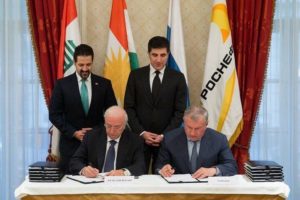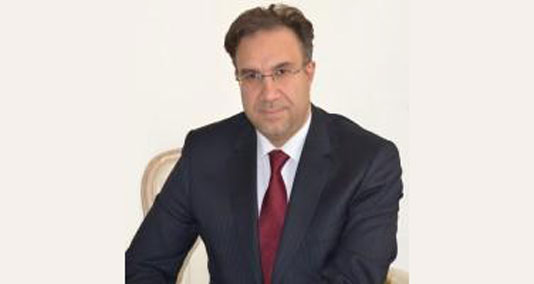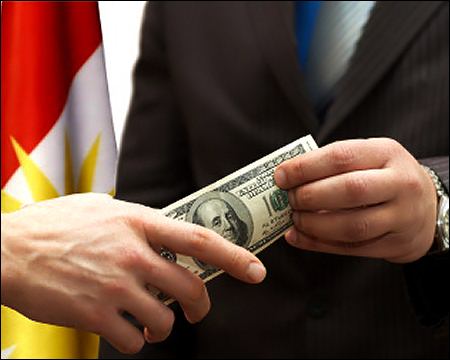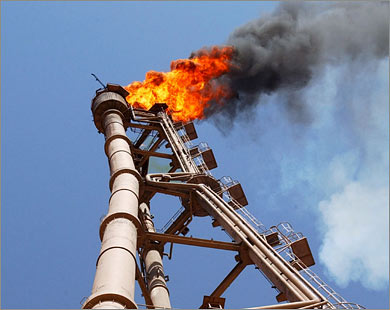
PHOTO: KRG PRESS OFFICE
The Minister of Natural Resources for the Kurdistan Regional Government Ashti Hawrami and Rosneft CEO Igor Sechin sign an oil agreement in Saint Petersburg, Russia, on June 2, 2017, as the Kurdish Deputy Prime Minister Qubad Talabani and Prime Minister Nechirvan Barzani look on.
This interview was first published in Kurdish Language by Xendan News Agency on 12th June 2017
Xendan: While the KRG is entangled within many legal issues with some companies, such as Dana Gas, previously made contracts with Exxon Mobile but the giant US oil producer withdrew from three oil blocs in the Kurdistan region, and the KRG even cannot pay salaries of its own employees, but has made a recent agreement with Rosneft, do you think the KRG has the production capacity and can fulfill its promises to Rosneft, namely exporting one million barrels of oil per day until the end of 2017?
Al-Khatteeb: We are already halfway through 2017 and any expansion in infrastructure will require significant work that I cannot imagine will materialize before the end of year. The current oil export level is around 500,000 barrels per day, mostly sustained by Kirkuk’s disputed cluster fields. Given the decline in MNR controlled oil fields and downgrade of reserves, I find it difficult to see exports doubling in the near future without major foreign investment commitments and KRG guaranties to honor repayments to international oil companies (IOCs).
However, it is without doubt that the recent entry of the Russia’s oil giant Rosneft to the Kurdistan Region represents a much-needed vote of confidence after the ISIS crisis and the investment downsizing of U.S. top IOCs as Exxon and Chevron relinquished 50% of their exploration assets. However, benefits will take time to materialize. The KRG’s internal and external debts are increasing by the day and have exceeded USD $25 billion according to some estimates, while legal claims against the KRG are close to $30 billion, collectively, this is more than 50% of what Saudi Aramco would wish to secure of their IPO next year from markets. Moreover, public sector salaries are still facing major delays; this is despite U.S. Govt. commitments to pay the Peshmerga hundreds of millions of dollars.
So, in a nutshell, the most immediate benefit of the Russians’ entry to KRI following the Rosneft deal, is to fill the vacuum that U.S. companies left behind after pulling out of many assets, to secure acreages in disputed territories, and also to consolidate the KRG’s position in case of commercial or land disputes with Baghdad after the forthcoming referendum on independence, and to support the KRG in any future challenges with Ankara as per control of oil pipelines. At the end of the day, Rosneft is 50% government owned, and managed by Putin’s right hand man, Igor Sechin.
Xendan: Recently there has been some optimism by the Iraqi oil minister and the Iraqi oil ministry’s spokesman, who spoke to Xendan, on resuming dialogue between Erbil and Baghdad, according to your point of view what will be the reaction by the Iraqi central government and Iraq’s oil ministry on the recent agreement between KRG and Rosneft? How will these agreements impede Iraq’s abidance to its agreement with OPEC for reducing its production and importation?
Al-Khatteeb: There is an amicable understanding between Erbil and Baghdad on export levels, and the latter are fully aware of the fact that the KRG needs maximum returns from oil sales to pay their outstanding dues, hence KRG oil is excluded from Iraq’s commitment to the OPEC cut agreement. As for how Baghdad would look at Rosneft’s entry to the KRI, it’s yet to be seen, although various parties in parliament have voiced their opposition. The Russians have signed 5 Production Sharing Agreements with the KRG, and have been offered very lucrative incentives with risk free deals, according to some sources. It seems that the KRG has offered the Russians a deal that is hard to reject and they are willing to defend it if challenged.
Xendan: In your opinion why a giant oil company, such as Rosneft invests in the Kurdistan region, while many oil companies has left the region?
Al-Khatteeb: This is a 50% Russian government owned company, and unlike many IOCs, it’s protected and supported by the Russian Federation, and the Russian government has a history of sidestepping international norms to protect its interests.
Xendan: How this recent agreement between KRG and Rosneft, have impacts on the Kurdistan Region’s internal political situation, the KRG’s relations with Turkey and Iran?
Al-Khatteeb: In my opinion, for the KRG to lure Rosneft into a volatile region they had to offer a lucrative deal with zero risk terms, to anchor them firmly in a fragile land locked region that can only be controlled by a super power. Currently, Baghdad, Tehran, Damascus and Ankara are not in a position to upset Moscow in case of commercial disputes that could impact Russia’s interests in Kurdistan. However, this will make Erbil more answerable to Moscow.
Xendan: What does the timing of signing these agreements tells us? Does the KRG rather invest in the political gains of its agreement with Rosneft while the time of the coming referendum on the region’s independence on next September nears?
Al-Khatteeb: Since the expiry of Masoud Barzani’s presidency in August 2015, unconstitutionally sacking the speaker of Kurdish Parliament and alienating key political parties and figures, the KRG has become more of a KDP controlled enterprise, and their main priority is to reinstate a legitimacy that many would argue has been lost. Fast tracking mega deals to win the KRG political gains before the forthcoming referendum is the only way to bring the KDP back to the forefront of Kurdish competition, prior any elections.
Xendan: According to your point of view, after signing the agreements how the US administration will react on the Kurdistan Region?
Al-Khatteeb: The current US Administration has its own internal challenges such as the investigation on Russia’s role in the presidential elections, beside the recent external crisis ignited by President Trump at the Riyadh Summit, which has led to the recent GCC crisis. This is the crisis between KSA led allies and Qatar. In the foreseeable future, I don’t think the Americans would interfere in any Russian involvement in Kurdistan Region of Iraq, given current problems in Syria and the overall campaign to rally efforts against ISIS. But one should take a long view when planning for future generations. The Kurds must not tailor their politics and economy on short term dynamics and fragile deals as this could backfire on all Kurds and compromise their interests in the long run.
(*)Luay al-Khatteeb is the founding director of the Iraq Energy Institute, co-founder of Iraq Heritage, nonresident Fellow at the Center on Global Energy Policy (Columbia University-SIPA), and honorary advisor to the Federal Parliament of Iraq on Energy and Economy. His past experience spans over twenty years in business development and public policy with executive capacities as director and senior advisor to various international oil companies, commercial banks and management consulting firms. In addition to his professional commitments, al-Khatteeb is an active participant and contributor to the Brookings Institution (as a former foreign policy fellow), Chatham House, Harvard Kennedy School of Government, and the Revenue Watch Institute. He is a frequent commentator in mainstream media on issues related to energy security, regional economy, and politics in the Middle East. His writing has appeared in Foreign Affairs, The New York Times, The Huffington Post, Al-Monitor, CNN, MEES, the Petroleum-Economist, The National Interest, About-Oil by AGI, The Oil & Gas Year, The National, and others.
Source: Huffington Post, 06/13/2017
http://www.huffingtonpost.com/entry/593faba7e4b0b65670e56da9








Comment here